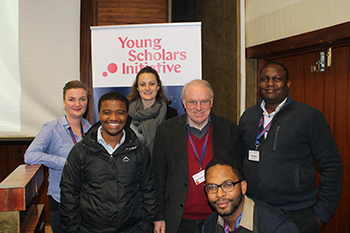Latest News Archive
Please select Category, Year, and then Month to display items
14 June 2024
|
Story Anthony Mthembu
|
Photo Suplied
 Jeremiah Hlahla, a UFS student completing his PhD in Botany at the University of Debrecen as part of an exchange initiative funded by the Erasmus+ Mobility Programme.
Jeremiah Hlahla, a UFS student completing his PhD in Botany at the University of Debrecen as part of an exchange initiative funded by the Erasmus+ Mobility Programme.
As part of an exchange initiative facilitated by the Erasmus+ Mobility Programme, Jeremiah Hlahla, a student at the University of the Free State (UFS), is nearing the completion of his PhD studies at the University of Debrecen in Hungary. Hlahla’s journey, which began in February 2024 and is set to conclude in July 2024, has been a remarkable learning opportunity. “As a first time-traveller to Europe, I have thoroughly enjoyed engaging with people from different countries and cultures,” he said.
The benefits of international collaboration
Hlahla is currently pursuing a PhD in Botany, focusing on plant stress physiology. “My current PhD project investigates the physiological, biochemical and morphological responses of vegetable-type soybean, or edamame, to combined drought and heat stress,’’ he explained. He considers the University of Debrecen the ideal institution to complete his research due to its extensive expertise and resources in similar projects. He noted that his colleagues at Debrecen conduct significant work on plant protection against biotic and abiotic stresses, including salt and drought stress, as well as proteins and amino acids in barley and other legumes.
Given the vast knowledge available on similar projects, Hlahla has found substantial engagement with his work at the University of Debrecen. “Upon arrival, I delivered an introductory lecture presenting my UFS project on the synergistic effects of combined drought and heat stress on the physiology and biochemistry of edamame. It was an engaging session as everyone could relate to my work and asked many questions,’’ he said.
Insights gained from the exchange
Hlahla has also gained valuable lessons that will assist him in his research career, including biotechnology and physiology tools. “I learned how to prepare samples and use high-performance liquid chromatography (HPLC) and reversed-phase ultra-high-performance liquid chromatography (UHPLC) to quantify proteins and amino acids,’’ he said. These techniques are beneficial not only for his current work but will also support future soybean research.
As his experience at the University of Debrecen nears its end, Hlahla reflects on the collaborations and friendships he has formed, which stand out as a significant highlight.
Professor from Cambridge University addresses young scholars
2017-07-18

In the first conference of its kind on the African continent,
the Universityof the Free State’s Bloemfontein Campus
was privileged to host the Young Scholars Initiative conference.
Photo: Siobhan Canavan
“It doesn’t matter where a concept originates from if it works. The problem arises when the concept does not work.”
These were the words of Prof Gareth Austin in his address at the Young Scholars Initiative (YSI). His keynote focused on the “Economic History in Africa’s Decolonisation and Development”.
The African economic history
Prof Austin, a professor in Economic History at the University of Cambridge, discussed how African economic history has always been about development, and also gave a brief periodisation of the economic historiography of Africa.
In his closing remarks he focused more on history and economics. “Economics is a sensible approach to take, where history matters because of the sense of context.”
Reflecting on the African experience
A total of 65 young and senior scholars from five continents attended the conference Decolonising Africa? The Economic History of Development, hosted by the YSI in partnership with the International Studies Group at the UFS.
The conference, held from 8 to 9 June 2017, provided an opportunity to reflect on the African experience from an historical perspective and to assess the current position of the continent in the global economy. It discussed new themes in development, such as the role of women, minorities, and entrepreneurs.
The conference focused on how the business community has operated in an Africa that still faces inequalities and unfair terms of trade and lacks a unified political will.